Cow Poop: Interesting Facts in 5 mints
Do you ever wonder what animal waste is used for? While it may seem an odd topic. Cow poop is one of the most important natural resources in use today. Its uses range from agricultural fertilizer to renewable energy. In this post, we’ll look at all things dung: its composition and benefits to fun facts about its users worldwide. Get ready to learn everything there is to know about cows and their droppings.
What Do Cows Eat?
Cows have always played a vital role in the food chain. From providing nourishing milk to enabling the production of meats, cheeses, and other dairy products. Cows are an essential ingredient in our diet and nutrition. But what exactly do these animals eat? Cows are herbivores, meaning their diet consists mainly of grasses and vegetation.
Although cows can eat grains such as wheat, barley, and corn. They prefer to graze on grassy fields, giving them the necessary vitamins and minerals they need to stay healthy. Furthermore, cows can extract more nutrients from their food through rumination – essentially a four-chamber stomach that helps churn partially digested foods. So they can absorb nutrients more efficiently.
It is thanks to this evolutionary process that humans have been able to benefit from the sustenance derived from cows for many centuries.
What is Cow Poop made of, and What are the Benefits of using it as a Fertilizer?
Cow poop, also known as cow manure, is largely composed of digested grass and grain combined with saliva. Gardeners and farmers highly value this semi-solid mixture of organic matter. Because it is an extremely effective fertilizer. Not only does cow manure contain essential nutrients like nitrogen and phosphorus.
But its compost-like quality helps the soil retain moisture and deters the growth of weeds. Thanks to cow poop’s abundance, it can be obtained relatively easily and at a low cost compared to other fertilizers. Therefore cow manure remains a popular choice for natural fertilizers for home gardening and commercial farming.
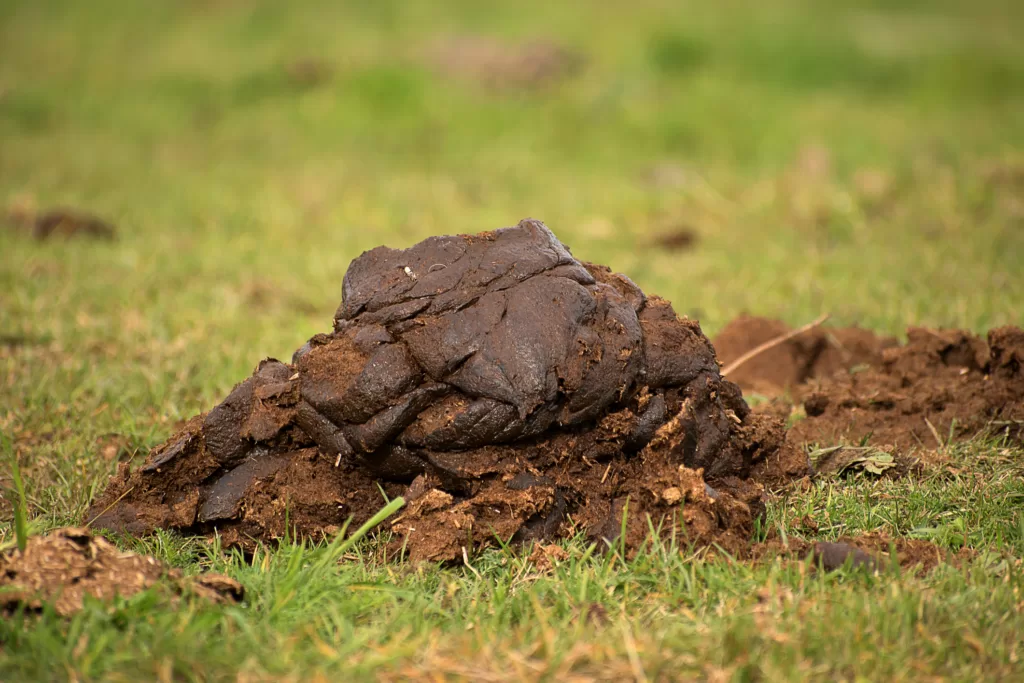
What Do We Call Cow Dung?
Cow dung is a type of manure created by cattle with high nutrient content and is widely used as an organic fertilizer to aid crop health. It has even been used to manufacture fuel and paper. “It has many names, including cow pie, cow manure, cow chips, and even patty cakes”. Though this last one probably needs to be its scientific name.
Cow dung is integral to sustainable farming practices and has numerous uses in agricultural fields. Not only does it help ensure normal crop production. But it can also help improve soil fertility for higher yields when incorporated with soil. Most farmers prefer using dung as organic fertilizer due to the lack of synthetic chemicals which could harm the environment.
What is Cow Poop Made of?
Cow poop may seem like a disgusting topic. But it certainly has a fascinating composition. What we call cow poop is made up of many different components- cellulose, proteins, lipids, and water are just some of the major elements in this type of waste.
Additionally, bacteria and other microorganisms found in the animals’ digestive systems also form an integral part of the mix. What makes cows particularly special is that they have one four-chambered stomach, which allows them to break down their food. Much more efficient and forms cow poop with higher concentrations of these essential elements. Than those found in other types of animal waste.
What does cow poop look like?
Cow poop is pretty gross. It’s usually brown and slimy, and it doesn’t smell good. Sometimes it’s green if the cow has been eating a lot of grass.
Cow Poop: Source of Energy
Did you know that cow poop can be used as an energy source? That’s right; cow manure can be converted into methane gas, generating electricity. Not only is this a renewable and eco-friendly way to power homes and businesses. But it can also help farmers reduce their environmental impact.
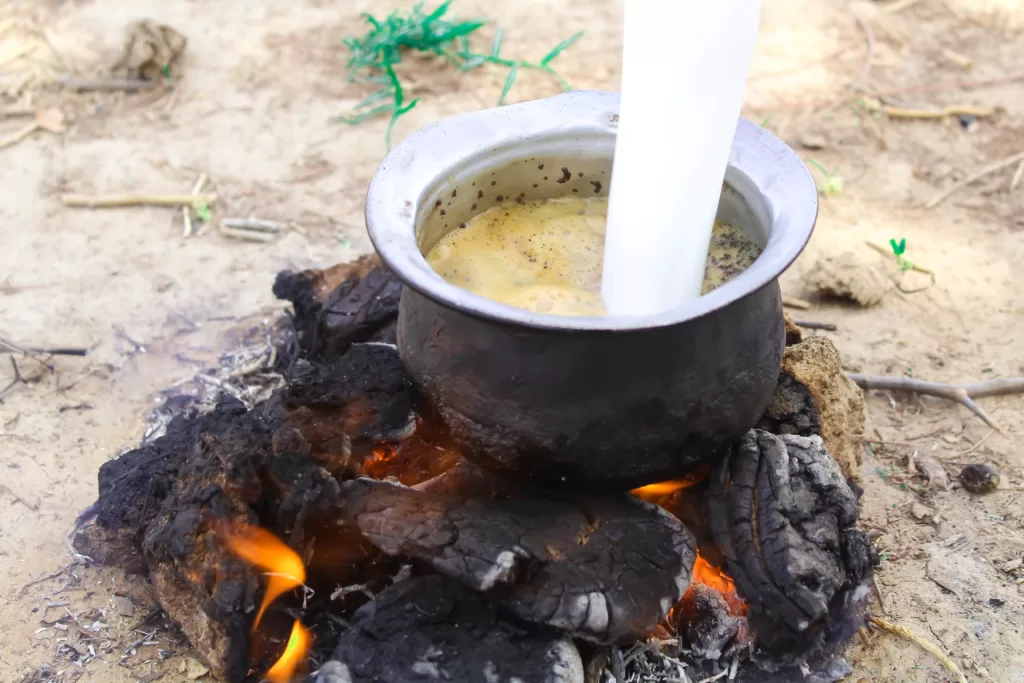
Cow Poop as Fertilizer
There are many benefits to using cow poop as fertilizer. For one, it is a great source of energy. The methane in cow manure can be used to generate electricity, heat homes, and even power cars. Additionally, using cow poop as fertilizer helps keep methane out of the atmosphere, a greenhouse gas contributing to climate change.

How do I collect cow poop for my garden or farmstead, and what are the best ways to use it as fertilizer there?
Collecting cow poop for fertilizer on a garden or farmstead is beneficial. It is important to ensure that cow poop is collected safely and correctly to protect both the cow and the environment. The cow droppings can collect from pens, fields, fences, hay rings, and other areas with cow traffic. When collecting cow poop ensure it is dry. As this will help prevent smell and certain diseases from spreading and keep your soil healthy.
The output of cow waste can also optimize for gardening using specific feed additives, providing optimum nutrient levels for your plants. Cow manure can also be composted before being put in the fields or gardens, creating enhanced nutrients that boost crop yields.
Cow Poop Source of Microbial Enzymes
It has been scientifically proven to be a valuable source of microbial enzymes.
- Such enzymes have a variety of uses – from cleaning products and pharmaceuticals to laundry detergents and soaps.
- Research has revealed that enzymes in cow poop can break down proteins, lipids, and carbohydrates, making them an invaluable tool for industrial processes.
- This natural enzyme source has the capacity to revolutionize a multitude of applications. But employing proper collection methods and secure storage is essential in order to ensure its purity.
- As a result, there is a huge demand for cow poop in the global market for its multiple benefits.
Cow Poop in Agriculture Management
Cow poop may not sound like the most exciting topic. But it plays a very important role in modern agricultural management.
- Farmers routinely use cow manure to improve crop yields and promote soil health. While storing large amounts of it can provide energy sources ranging from electricity to biogas.
- Even when cows aren’t used directly for their feces. They can be a part of regenerative agriculture practices that ultimately enrich the land with essential elements from their manure. All in all, cow poop has become an integral part of sustainable farming.
- So understanding its contributions is necessary for anyone seeking to understand modern agricultural management.

Cow Poop: Bioremediation of environment pollutants
Bioremediation with cow poop has shown promise to reduce environmental pollutants. Such as heavy metals and organic compounds like diesel fuel. Studies have demonstrated that fertilizing ecosystems with cow waste can significantly reduce soil, air, and water contaminants. Bioremediation with cow manure is an effective way to protect our planet from many kinds of toxic pollutants.
What potential dangers are associated with using cow manure as fertilizer, and how can I avoid them in my garden or farmstead?
Although cow manure has its benefits as a fertilizer due to its high nutrient content. It can bring potential dangers to your garden or farmstead when used improperly. If cow poop is left out in the sun for too long. It can become toxic and contains weed seeds which could cause an infestation of weeds.
Cow manure has the potential to be a great addition to your garden, farmstead, or other purposes. But it can also come with hidden dangers. To make sure you’re getting all the benefits and none of the drawbacks of cow poop, look for well-aged poops that are free from any foreign contaminants. Composting is an excellent preventative measure against unexpected issues.
Are there any other uses for cow poop that I should know about before deciding whether or not to start using it myself?
- Cow manure, also known as cow poop, has multiple uses. Aside from its common use as a fertilizer for crops and vegetables.
- Cow manure can also generate energy.
- Studies have suggested that cow dung applied directly on wounds can resist bacterial growth and suppress the effects of some fungal infections.
- Cow poop’s abundance of methane gas can capture and directed through turbines to create electricity.
- In addition, cow poop can process into a combustible object called cow dung cake. Cow poop is use as fuel in some places worldwide. Such as India and Pakistan.
- Cow manure has been found to have antiseptic qualities.
- It is interesting to note that cow manure not only serves more than one purpose. But also offers great potential for aiding agricultural needs while protecting the environment at the same time.
Where can I find more information on using cow manure as a fertilizer and other sustainable farming practices?
Cow manure is a great source of sustainable fertilizer for crops and gardens. As it has high nutrient content and contributes to reducing chemical waste. There are plenty of resources online to learn more about cow manure use. Government websites such as the United States Department of Agriculture host many how-to guides on cow poop use and other sustainable farming practices. Such as permaculture and regenerative agriculture.
Other helpful sources include blogs from agricultural professionals or farmer’s markets who have firsthand experience with cow manure fertilizer. Locating workshops near you that focus on cow manure use and other sustainable farming techniques can also be beneficial in gaining insight into cow poop usage in an agricultural setting.
Is Cow Dung Good For Human Health?
Recent studies have linked its use to improved nutrition, agricultural sustainability, and even therapeutic effects from its minerals and compounds. Such as ammonia and potassium oxide. While it is an effective fertilizer, there are safety concerns when using cow dung to improve human health.
It must be properly prepared and used in limited amounts to ensure no adverse effects arise. With caution and proper preparation, cow dung could serve as an important natural resource with tremendous benefits for agriculture, food production, and human health.


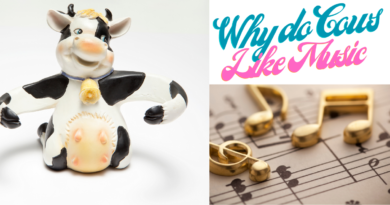
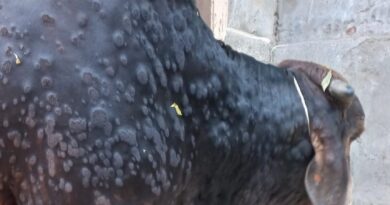
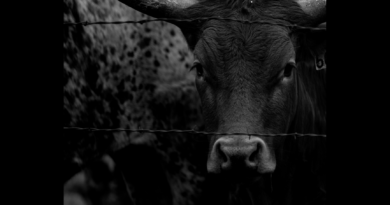
Great info. Thx
Good to know.